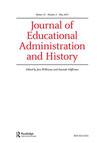The bans on teaching CRT and other ‘divisive concepts’ in America’s public schools
IF 1.6
Q2 EDUCATION & EDUCATIONAL RESEARCH
Journal of Educational Administration and History
Pub Date : 2023-09-21
DOI:10.1080/00220620.2023.2259813
引用次数: 0
Abstract
ABSTRACTThe Arizona state legislature has aimed to pass a series of bills banning those in schools from teaching topics associated with inclusion, social justice, and equity. Since 2020, the legislature has targeted teaching ‘critical race theory’ (CRT), often (mis)using the term to refer to any ideas related to systemic discrimination and racial inequality. The debates on the need to educate children about race and racism are ongoing, and school leaders in Arizona have been cast into the debate on the CRT bans. In this study, I put actor–network theory (ANT) to work to explore how school leaders navigate the uncertainties, contradictions, and controversies of the debate and potential bans. I demonstrate the ways in which ANT is particularly useful in exploring controversies in education leadership and policy that bring to the fore the uncertainties of who is acting, when, with what and whom – for what purposes.KEYWORDS: Actor–network theory (ANT)critical race theory (CRT)school principalspolicy AcknowledgementsI thank the principal participants highlighted in this piece and the other school leaders who are participating in the larger ethnography from which this paper emerged. Theirs is a difficult and important job, even in less politically volatile times, and I appreciate their courage to share their experiences.Disclosure statementNo potential conflict of interest was reported by the author(s).Additional informationNotes on contributorsJill KoyamaJill Koyama, a cultural anthropologist, serves as vice dean and professor of the Division of Educational Leadership and Innovation in Arizona State University's Mary Lou Fulton Teachers College. Her research is situated across several integrated strands of inquiry: the productive social assemblage of policy; the controversies of globalizing educational policy; the politics of immigrant and refugee education; and community organizing and activism.禁止在美国公立学校教授CRT和其他“分裂概念”
摘要亚利桑那州立法机构旨在通过一系列法案,禁止学校教授与包容、社会正义和公平相关的主题。自2020年以来,立法机构将教学目标定为“批判种族理论”(CRT),通常(错误地)使用该术语指代与系统性歧视和种族不平等有关的任何想法。关于对孩子进行种族和种族主义教育的必要性的辩论正在进行中,亚利桑那州的学校领导也被卷入了关于CRT禁令的辩论中。在这项研究中,我运用行动者网络理论(ANT)来探讨学校领导如何应对辩论和潜在禁令的不确定性、矛盾和争议。我展示了ANT在探索教育领导和政策争议方面特别有用的方式,这些争议突出了谁在行动、何时行动、用什么行动、为了什么目的而行动的不确定性。关键词:行为者网络理论(ANT)批判种族理论(CRT)学校校长政策致谢我感谢这篇文章中强调的主要参与者和其他参与更大的民族志的学校领导,这篇文章就是从这些人开始的。即使在政治不那么动荡的时代,他们的工作也是困难而重要的,我很欣赏他们分享经验的勇气。披露声明作者未报告潜在的利益冲突。吉尔·小山(jill Koyama),文化人类学家,亚利桑那州立大学玛丽·卢·富尔顿师范学院副院长兼教育领导与创新系教授。她的研究跨越了几个完整的探究方向:政策的生产性社会组合;教育政策全球化的争议;移民与难民教育的政治;社区组织和行动主义。
本文章由计算机程序翻译,如有差异,请以英文原文为准。
求助全文
约1分钟内获得全文
求助全文
来源期刊

Journal of Educational Administration and History
EDUCATION & EDUCATIONAL RESEARCH-
CiteScore
3.80
自引率
5.60%
发文量
25
 求助内容:
求助内容: 应助结果提醒方式:
应助结果提醒方式:


